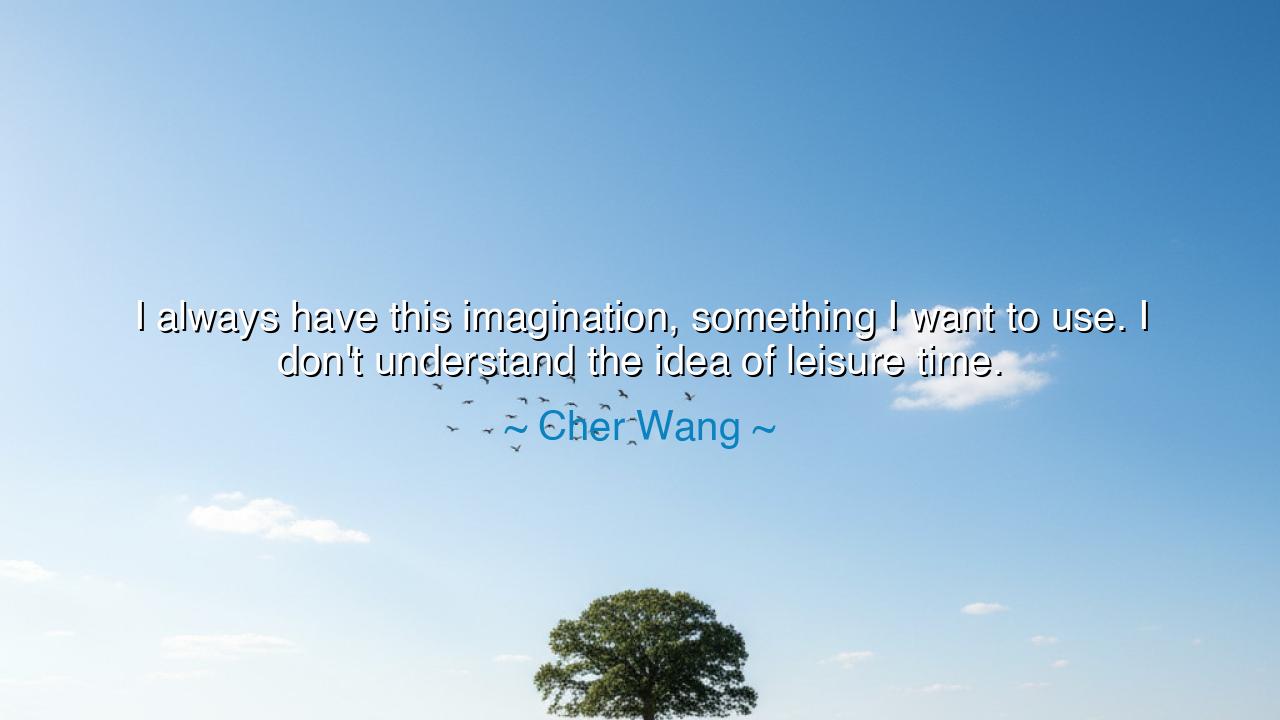
I always have this imagination, something I want to use. I don't
I always have this imagination, something I want to use. I don't understand the idea of leisure time.






“I always have this imagination, something I want to use. I don’t understand the idea of leisure time.” So spoke Cher Wang, visionary builder of the digital age, co-founder of HTC, and a woman whose life burns with the sacred fire of purpose. Her words ring with the timeless spirit of creation — a truth known to all who have ever felt the restlessness of genius stirring within their souls. In her, the imagination is not a quiet dreamer but a relentless river, flowing day and night, seeking always to give life to new forms, new ideas, new realities. She speaks not of toil for its own sake, but of the joy of becoming — the deep, unending dance between imagination and action.
In the heart of Cher Wang’s saying lies an ancient understanding: that the creative soul knows no true leisure, for creation itself is its rest. To such a spirit, idleness is not peace, but a kind of exile. The hands may be still, but the mind continues its voyage through unseen lands. This is not the restlessness of discontent, but the sacred hunger of those who see the world as unfinished — who feel called, as artists and inventors have through all ages, to lift what is toward what can be. Imagination, for such people, is not a pastime; it is breath itself.
From the dawn of history, this divine restlessness has shaped the course of humankind. Consider the tale of Thomas Edison, who, like Wang, could not abide the stillness of leisure. When others slept, he worked by the flicker of oil lamps, lost in thought, driven by the same whispering fire of imagination that would one day bring light to every home. To him, creation was not a task but a calling. His lab was his temple, his inventions his prayers. Edison once said, “Genius is one percent inspiration and ninety-nine percent perspiration” — and in those words echoes Wang’s own creed: that to imagine is divine, but to use imagination, to shape it into the world, is the truest act of devotion.
Cher Wang stands as one among many in a lineage of visionaries who have bridged the unseen and the real. As a woman who rose in the world of technology — a field once closed to her gender — her refusal to rest was not ambition alone but conviction. She understood that imagination unused is like light trapped in a jar: beautiful, yet wasted. For her, leisure was not rest, but the slow death of possibility. Every thought, every spark, demanded birth. And so she worked, not as one enslaved by labor, but as one liberated by purpose.
The ancients would have understood her well. The philosophers of old spoke of energeia — the divine act of being fully alive in motion, of fulfilling one’s purpose through creation. The artist painting, the farmer sowing, the thinker reflecting — each in their element, each at rest within their work. This, too, is what Wang means when she says she does not understand leisure. For to her, leisure is not the absence of effort, but the absence of meaning. The true rest of the soul lies not in stillness, but in flow, when one’s hands and mind move in harmony with one’s purpose.
Yet, her words are not a rejection of rest, but a redefinition of it. Leisure that numbs the mind is barren; rest that renews the spirit is sacred. There is a vast difference between escaping life and entering it more deeply. The one seeks forgetfulness, the other seeks fullness. Imagination, when given voice through work, becomes a form of worship — the soul’s offering to the universe that created it. Wang’s words remind us that our greatest peace often comes when we are building, dreaming, and shaping something beyond ourselves.
So take this lesson, O seeker of purpose: do not fear the fire that drives you. Do not silence the imagination that keeps you awake with visions of what might be. Let your rest be found in creation, your peace in pursuit, your joy in the unfolding of your gifts. The world does not need more comfort; it needs more creation. Do not spend your days merely resting from life — spend them alive within it, using all that burns within you. For as Cher Wang teaches, the truest leisure is not in doing nothing, but in doing what you were born to do.
Thus remember: Imagination is the divine spark, but purposeful action is the sacred flame. Tend to it always. Use it well. And in the endless rhythm of work and wonder, find not exhaustion — but transcendence.






AAdministratorAdministrator
Welcome, honored guests. Please leave a comment, we will respond soon